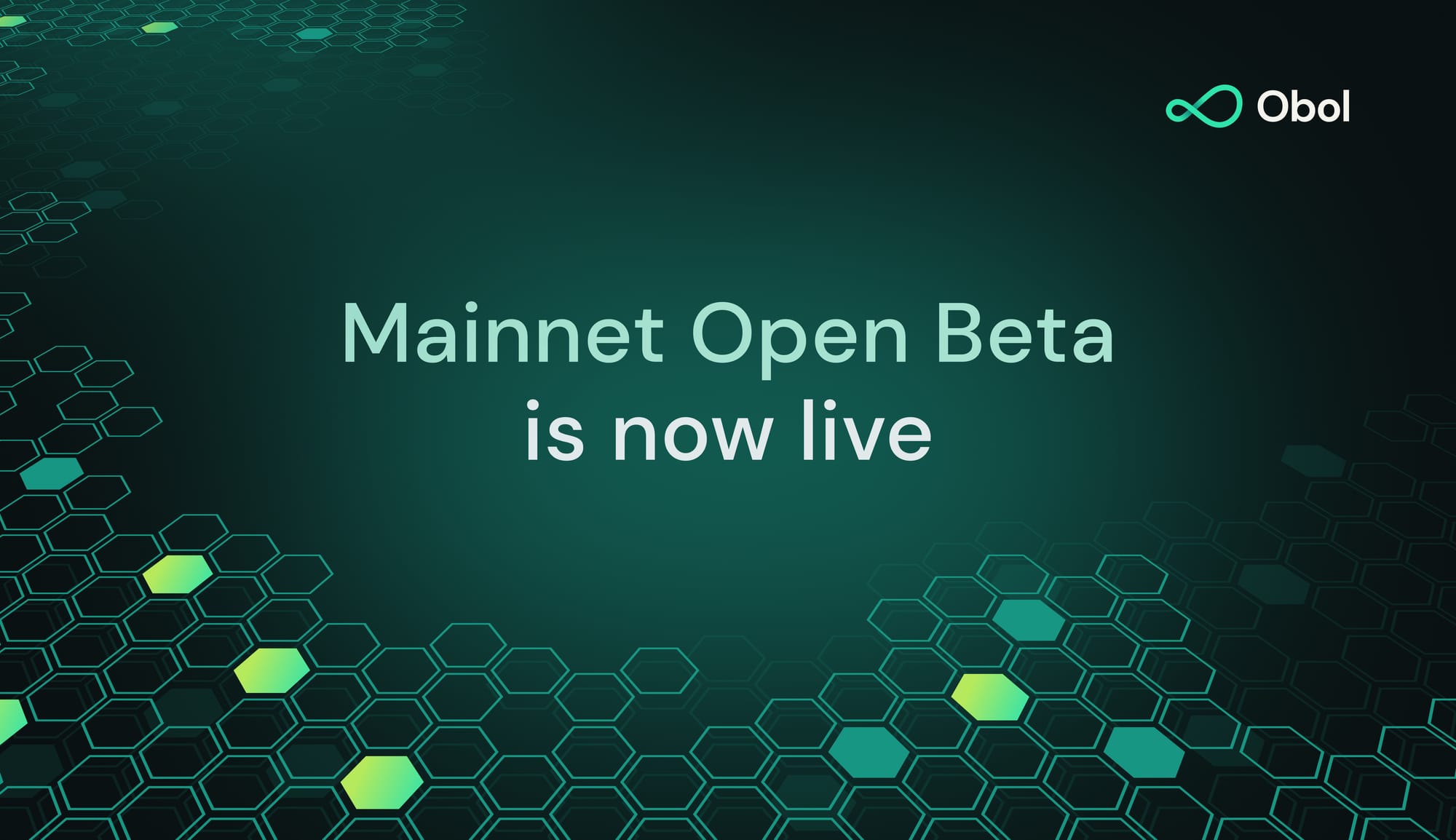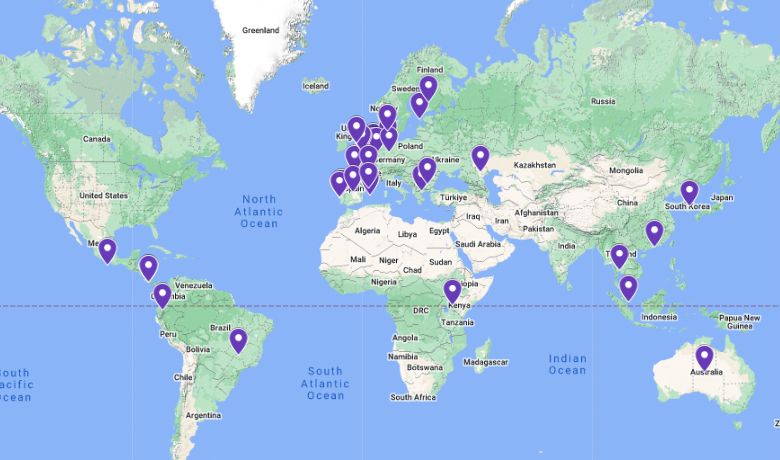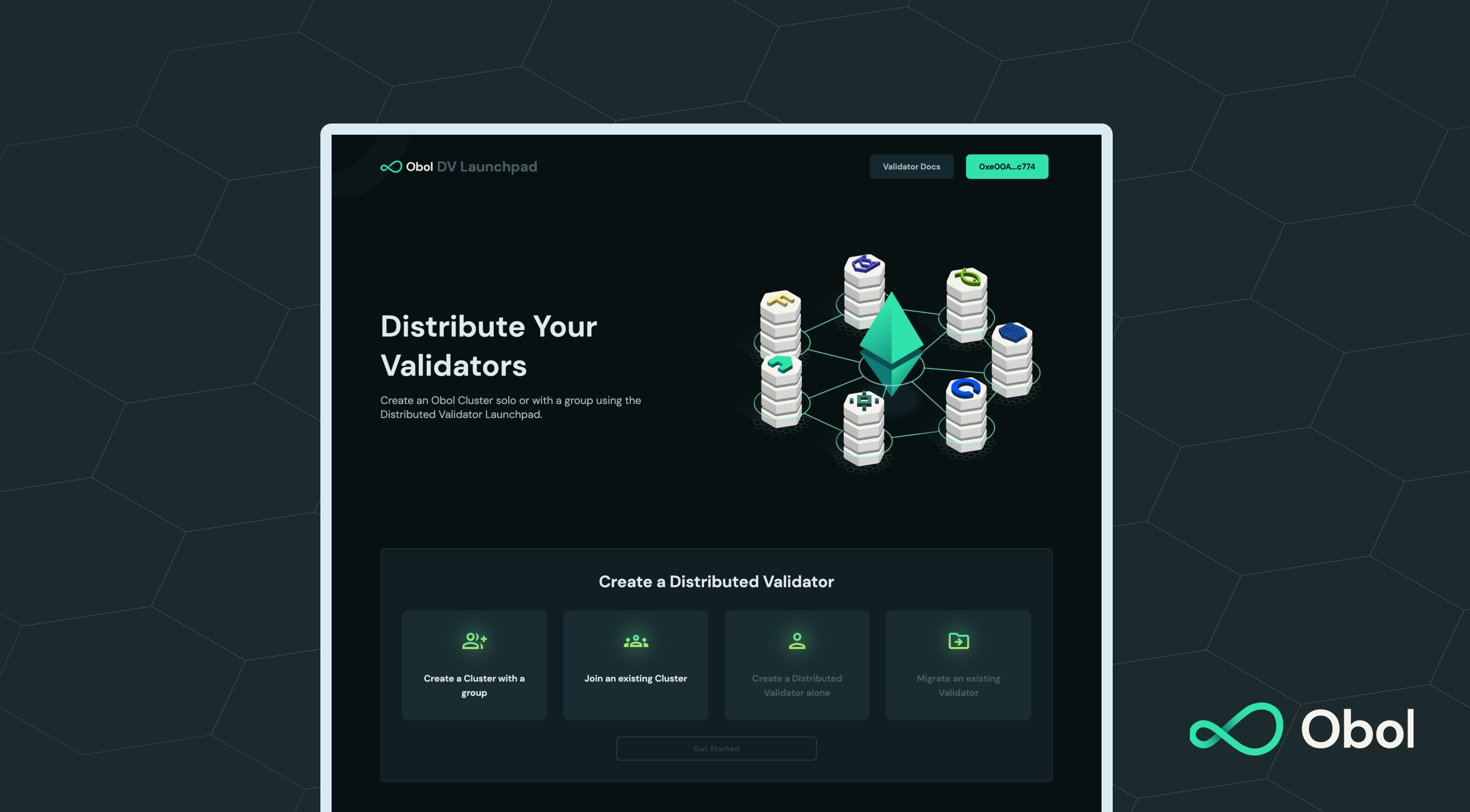Announcing our Mainnet Open Beta Release!
Today, we’re pumped to share that we’ve launched our Mainnet Open Beta phase! After years of development, testing, and initial Mainnet rollout, we are ready for our Beta launch!! It is time to allow everyone to run Mainnet distributed validators.

It’s time to make squad staking a reality.
Today, we’re pumped to share that we’ve launched our Mainnet Open Beta phase! After years of development, testing, and initial Mainnet rollout, we are ready for our Beta launch!
It is time to allow everyone to run Mainnet distributed validators. We've launched our DV Launchpad on Mainnet, now available at beta.launchpad.obol.tech. Anyone can now configure, set up, and operate a distributed validator on Mainnet. Whether you are a professional validator, community validator, or solo staker, DVs can drastically improve the resiliency, security, and decentralisation of your validators. Don’t wait to start #squadstaking!
While we hope that all validators run DVs, we also recognize the importance of doing so responsibly. To that end, we strongly recommend that validators have experience running on testnet before launching a Mainnet DV, either on Görli at goerli.launchpad.obol.tech, or on Holesky at holesky.launchpad.obol.tech. To support people in their effort to gain and prove experience, we are launching the Obol Techne Credential program.
Calling all developers. You now have the tools to develop with Obol!
In addition to launching our DV Launchpad on Mainnet, we are equally excited to announce the release of two developer-focused products that will allow builders to start developing their own staking products using Obol DVs: the Obol SDK and Obol Splits. This is another major step towards decentralising the Obol Network (in addition to our work on Obol V2) and allowing the entire staking community to innovate while ensuring security, resilience, and decentralisation. Help us strengthen and decentralise Ethereum!
Can’t wait to find out all the details? Let’s dig in ⛏️
Everyone, distribute your validators!
Distributed validators drastically improve the resiliency and security of your validators, while also allowing you to collectively validate with others to improve fault tolerance and spread the bonding requirements (read more about the benefits of DVs).
Our recent Mainnet Alpha phase saw 45+ organisations and 40+ individuals stand up and run highly effective Mainnet DVs across 6 continents and 30+ countries. Through our collaboration with EtherFi, DappNode, and Avado, we allowed at-home validators to run 4 different clusters around the world, enabling community and solo stakers to run a validator as a group for the first time.

The overall success of our Mainnet Alpha phase has given us the confidence to open up our suite of DV tools to allow everyone with adequate experience running validators to stand up a DV on Mainnet. Here’s how we’re going to do it.
Our next phase will be an Open Beta phase where anyone can access our DV Launchpad and set up a DV cluster.

Since it is a Beta phase, access to DVs does come with the following caveats:
- Each DV cluster will be capped at 1 validator (based on ETH depositor): While we’ve completed various security assessments (which you can access here), we will still do a second audit of Charon prior to our V1 launch. To ensure we are doing our part to manage risk while allowing broad access, for this Beta phase each public DV cluster will be capped at 1 validator.
- We recommend having experience running validators: While DVs drastically reduce the barriers to running a validator (i.e. increasing fault tolerance, reducing individual bonding requirements, etc.), running a high-quality DV will still require operators who are knowledgeable about running nodes. During this launch, we will also provide resources and a path to developing your Obol DV experience; details a little later.
Your opportunity to help secure the future of Ethereum
It is time. We are looking for participants from across the staking ecosystem to join us in the penultimate step of our journey to V1. Whether you are a staking provider, developer, community validator, solo staker, or just a staking enthusiast; this is your opportunity to run a DV. For experienced node runners, this is your opportunity to drastically improve the resiliency and security of your validators. For those looking to gain experience running validators, this is your opportunity as DVs reduce the risk and barriers to running validators for the first time. In doing so, all of you will be helping us improve the security, resiliency, and decentralisation of Ethereum.
To help you get started, we’re launching a series of programs to provide opportunities no matter which part of the staking ecosystem you’re in.
Here’s how you can participate.
Run a DV on Ethereum Mainnet
We’ve opened up access for everyone to be able to run a DV on Ethereum Mainnet! You can use the Obol DV Launchpad to configure and activate your cluster. For the Open Beta phase, each cluster will be capped at one validator. Please refer to our docs for more instructions!
Register for EtherFi’s Operation Solo Staker
Earlier this year, we helped launch Operation Solo Staker together with EtherFi, DappNode, and Avado. This program offers the opportunity for experienced individuals to participate as a node operator for EtherFi.
The essence of decentralization is diluted if the platforms we build are anchored to centralized structures. @ether_fi we have committed to decentralization as a primary objective. Operation Solo Staker are our words in action. Learn more in our co-authored blog with @ObolNetwork…
— ether.fi (@ether_fi) November 8, 2023
Recent tweet from Ether.Fi on Operation Solo Staker
If you’re interested, you can register here.
Learn about Lido’s SimpleDVT module
In early November, a proposal was approved by the Lido DAO for the first new Mainnet module in Lido, and the first Mainnet module to run DVT.
SimpleDVT - a new staking module using Distributed Validator Technology (DVT) through @ObolNetwork & @ssv_network - is coming to Lido ✅
— Lido (@LidoFinance) November 6, 2023
Full breakdown here: https://t.co/XhB8CV8NXH
Stay tuned for more! pic.twitter.com/zFj34xgoOD
Recent tweet from Lido on the approval of Simple DVT
This is a key step towards helping decentralise the Lido node operator set and improving opportunities for community validators to participate in securing the network.
While registrations for the first wave of node operators have closed, there will be additional opportunities in the future as this module grows.
Earn your Obol “Techne” Credential
In Ancient Greece, “techne”, meaning art, skill, or craft, was a philosophical concept that refers to making or doing. Today, techne represents the possession of practical knowledge.
One of the key values and main goals of Obol DVs is to decentralise the network by allowing more people to participate in running validators. To help shepherd a new wave of validators, we’re launching the Obol Techne Credential program. Each Obol Techne Credential is a non-transferrable NFT, which you can use to prove and showcase the experience you’ve gained with Obol DVs.
To earn your Techne, you will need to complete a series of DV-related trainings and tasks that demonstrate your understanding of DVs and show your ability to run a highly-performant DV for an extended period.
Once you earn your Techne, you will have a provable credential that can be used to objectively prove your experience, which in turn will improve the likelihood that you will be presented with opportunities to run validators in staking services.
Read more in our blog post about the credential program.
Connect with our team for partnership opportunities
We are always looking to develop partnerships and further collaboration with staking providers in the space. If you would like to connect with our business team, please fill out this interest form.
We’re extremely excited about this next phase in our journey. There are now multiple ways for each individual in the staking ecosystem to run DVs, improve the resiliency of validators, and provide better stake security. As we said before, it’s time to make squad staking a reality. 🚀
